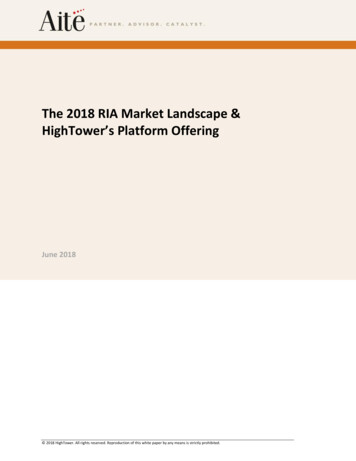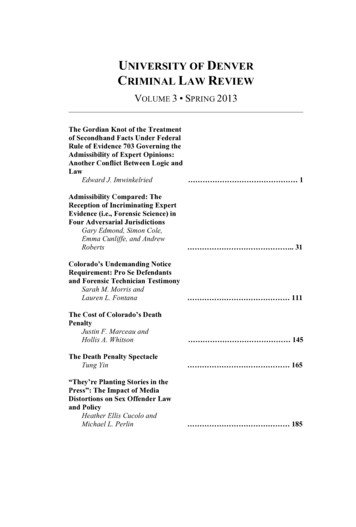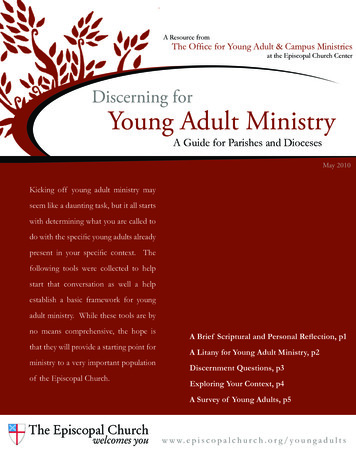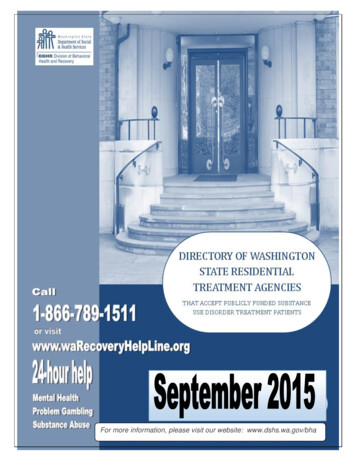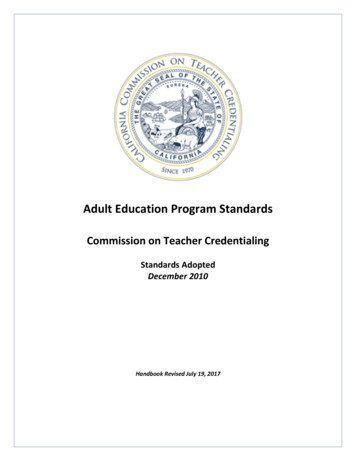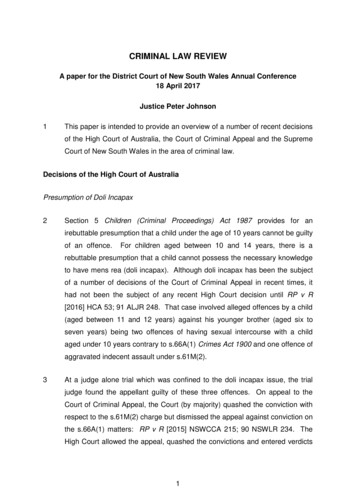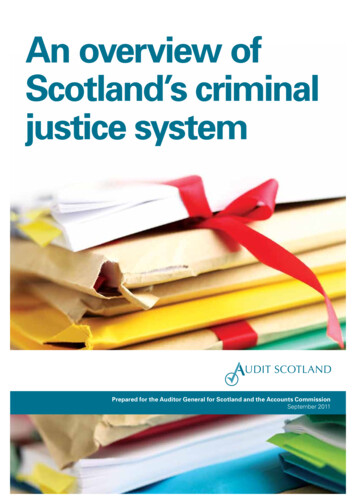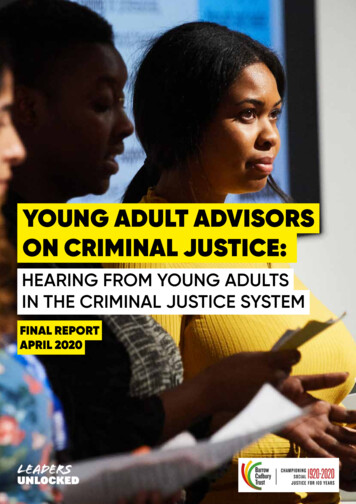
Transcription
YOUNG ADULT ADVISORSON CRIMINAL JUSTICE:HEARING FROM YOUNG ADULTSIN THE CRIMINAL JUSTICE SYSTEMFINAL REPORTAPRIL 2020Young Adult Advisors on Criminal Justice: Hearing from Young Adults in the Criminal Justice System1
LAURA“I wanted to make a change so everything that happenedto me when I was younger doesn’t happen to the nextgeneration. I was treated badly due to my mental healthissues, like being put in an isolated cell and a suicide suit.Being on the Young Advisors project I’ve gained confidence,a great team of friends, and more knowledge of the criminaljustice system. It’s definitely changed me; now I talk a lot moreand I’m much more willing to come out of my comfort zone.”
INTRODUCTIONThis report has been co-produced by Leaders Unlocked and young adults with first-handexperience of the criminal justice system.The Young Adult Advisors on Criminal Justice are a national group of young adults aged 18to 25 years with various lived experiences of the criminal justice system. The group uses thepower of lived experience to inform changes in policy, service design and delivery.Leaders Unlocked established the Young Adult Advisors group in 2016, with support from theBarrow Cadbury Trust. After a successful pilot in 2016, the Young Adult Advisors expanded torecruit more young adults to join the project and to conduct peer-led research on a broaderrange of priority topics.From start to finish, the project has been driven by the Young Adult Advisors, enabling them tolead the research, gather the findings and put forward solutions to the problems they identify.The Young Adult Advisors project aims to: Equip young adults with lived experience to play a leadership role working with policymakers and others involved in reform Take a peer-led approach to gather and represent the views of young adults on thecriminal justice system Produce youth-centred reports capturing the views of young adults on the criminal justicesystem Act as a sounding board to inform the Transition to Adulthood (T2A) Alliance Present insights and recommendations to policy-makers and others working on reform.ABOUT THIS REPORTThis report is based on peer-led engagement with over 500 young adults across thecountry. Each section features verbatim quotes from young adults and outlines the mainrecommendations the advisors have put forward for agencies and decision-makers to consider.This report is intended to act as an unmediated, reflective record of what young adults havetold us through this peer-to-peer research process. It is also intended to be the starting pointfor further thought and action on the part of policy-makers and practitioners.Please note: This research was carried out and the report drafted prior to the COVID-19pandemic. The pandemic will clearly have a significant impact on young people in the criminaljustice system. It will put further strain on young adults and the voluntary and communityorganisations that support them. It is important to take account of the views of young people inthis difficult time.Young Adult Advisors on Criminal Justice: Hearing from Young Adults in the Criminal Justice System3
WHAT WE DIDRECRUITING YOUNG ADULT ADVISORS:We worked proactively through partnerorganisations across England to recruit adiverse cohort of 20 young adults with a widerange of lived experience including youthcustody, adult prisons, YOTs, communitysentences, arrest, stop and search, and policecustody.SELECTING PRIORITIES:Working together, the Young Adult Advisorsidentified a shortlist of topics they were keento address through their peer-led researchand collaborative work with policy makers.This shortlist was based on what the groupwas passionate about changing, and whatthey saw as urgent priorities affecting otheryoung adults in the justice system.The Young Adult Advisors chose to focuson the following 5 priorities: Racial DisproportionalitySentencing Young AdultsThe Care SystemMental Health and the CriminalJustice SystemEmployment and Life after PrisonDESIGNING TOOLS FOR PEER RESEARCH:The Young Adult Advisors co-designed toolsfor peer research to address each of their5 priorities. The group decided to use tworesearch methods for their peer research,as follows:Peer-led workshops to gather in-depth,collective responses from groups of youngadults. The workshops were facilitated bythe advisors and supported by a memberof Leaders Unlocked staff. They involvedinteractive exercises to identify commonissues and potential solutions. The workshopexercises included standing debates, fictionalcharacter-based scenarios, and mindmapping.Structured surveys to gather individualresponses to a range of quantitative andqualitative questions. This method was usefulfor enabling young adults to offer insightsthey were not comfortable sharing in a groupworkshop setting.DELIVERING THE PEER RESEARCH:Over a 12-month period, the Young AdultAdvisors conducted peer research acrossEngland with over 500 other young adultsaffected by the criminal justice system. TheYoung Adult Advisors led the process, therebycreating trust and rapport with the youngadults who participated.4This peer-led process engaged youngadults between the ages of 14 and 25, in arange of settings including prisons, YouthOffending Institutions (YOIs), Youth OffendingTeams (YOTs), and voluntary/ communityorganisations connected to the CriminalJustice System.Leaders Unlocked
PRESENTING THE FINDINGSAND RECOMMENDATIONS:In November 2019 the Young Adult Advisorsheld a showcase event in London atwhich they presented their key findingsand recommendations in relation to the 5priorities to an audience of approximately50 key stakeholders from the justice sectorincluding Her Majesty’s Prison and ProbationService (HMPPS), Ministry of Justice (MoJ),Her Majesty’s Inspectorate of Probation(HMI Probation), Youth Justice Board (YJB),Independent Office for Police Conduct (IOPC),and leading justice charities such as Clinksand Prison Reform Trust. The response tothis presentation was hugely positive anddelegates identified ‘pledges’ for futurecollaboration with the Young AdultAdvisors group.WORKING WITH PARTNERS:Over the 2018-19 period, the Young AdultAdvisors also worked in collaboration witha range of public and charitable bodies toprovide advice, challenge and insight froma young adult perspective. Some of thesecollaborations included: Work with HMPPS on their 10-yearstrategy for prisons and probation; Work with MoJ presenting insightsand solutions in relation to racialdisproportionality in youth justice; Being guest speakers and panellists atevents held by Her Majesty’s Inspectorateof Prisons (HMI Prisons) and UnlockedGraduates to reach their current andfuture workforces; Work with Revolving Doors to informan initiative to improve approaches topolicing vulnerable young adults; Work with the Howard League forPenal Reform to inform new sentencingprinciples for young adults.Young Adult Advisors on Criminal Justice: Hearing from Young Adults in the Criminal Justice System5
ACKNOWLEDGEMENTSWe are grateful for the support of a wide range of national partners who have allowed theYoung Advisors to consult with the young adults in their organisations. Thanks go to:HMP & YOI Askham GrangeMidland Heart FoyerBarnet YOTNacro (Peterborough Centre)HMP & YOI BrinsfordHMP PentonvilleHMP BrixtonSalford YOTHMP BureHMP StaffordHMP BronzefieldStaffordshire YOTHMP HatfieldSt Giles TrustHMP & YOI IsisHMYOI WerringtonLeeds Youth Offending ServiceHMP Wormwood ScrubsWe would like to thank the T2A Alliance andthe Barrow Cadbury Trust for their continued,invaluable support of this work. We wouldalso like to thank HMYOI Werrington and HMP& YOI Isis for allowing us the opportunity toestablish young advisors groups within theirsettings to undertake peer research withlarger numbers of young adults in their care.Thanks also go to the Ministry of Justice,HMPPS, and HMIP as well as Revolving Doors,the Howard League for Penal Reform andUnlock Graduates, for providing the groupwith opportunities to contribute to theirongoing work on criminal justice development.A special thanks goes to the Young AdultAdvisors who have worked tirelessly to coproduce this report. These include: NtaleEastmond, Sarah Hack, Nadine Smith, SadiaBegum, Laura Wenn, Romaine Murchison,Fatmata Jah, Samia Hersi, Jodie Beck, ElijahMochia, Jhanzab Khan, Joshua Kilembeka,Fardowza Ali.Young Adult Advisors on Criminal Justice: Hearing from Young Adults in the Criminal Justice System7
RACIALDISPROPORTIONALITYWHAT WE DIDOur work on the topic of racialdisproportionality follows our work feedinginto the Lammy Review in 2017. As HMPPSand other agencies are currently workingon implementing the recommendations ofthe 2017 Review, we wanted to revisit thoserecommendations and gain a greater insightinto the issues facing Black, Asian and MinorityEthnic (BAME) young adults experiencing thecriminal justice system. We consulted withover 300 young people on this topic, in abroad range of prisons, working withYouth Offending Teams and Young AdvisorPeer Networks.OUR FINDINGSThere is a lack of BAME representation in decision-making roles throughoutthe criminal justice system.Young people told us that, on their journeythrough the criminal justice system, thedecisions being made about them were madeby people that did not reflect the communitiesthey came from. This contributed to BAMEyoung adults feeling that their background,where they came from, and their supportneeds, were not understood by decisionmakers. This had the effect of alienating BAMEyoung adults from the criminal justice process,making it difficult for them to engage in andunderstand what is happening to them.“We have nothing in common with the officersand there are hardly any ethnic officers – thisdoesn’t make me feel comfortable here. Itfeels like they only cater to one race”“Not enough black officers hired in the justicesystem”“Some judges target you but when you havea judge that understands, your experiencecan be more positivein courts”BAME youths feel like they are repeatedly targeted by police officers, which canbe traumatising.In our 2016 report, Race and the CriminalJustice System, we found that young BAMEadults felt targeted by the police in their localareas. The subject of police targeting cameup again in our 2018/19 workshops on racialdisproportionality, with most participantsexpressing that they felt repeatedly targetedby the police. The fact that this kept onhappening created permanent disaffectionand, in some cases, had the effect oftriggering past trauma.“Targeted in key areas around Birmingham –stopped and searched 11 times in less than 24hours”“When you’re young and black, you faceautomatic suspicion”“The more you’re arrested, it’s like going backin time and [it’s] re-traumatising”Young Adult Advisors on Criminal Justice: Hearing from Young Adults in the Criminal Justice System9
In court, BAME young adults feel instantly judged due to race and/or religion.Most participants felt that there was aninstant judgement made about them in courtdue to their race and/or their religion. Thiswas particularly damaging for BAME youngadults who were also religious as stereotypesregarding their race and religion intersected,creating a particularly uncomfortableexperience for them.“If you’re a black guy in tracksuits, it don’tlook good for you”“White co-defendant got half the sentence ofa mixed race male even though charged withsame offence and the white co-defendanthad previous similar convictions”“The word ‘terrorist’, people think Muslim andblack people white people, if they do something wrong, it goes to mental health”“You feel judged by 12 people who knownothing about you which gives you so manyemotions”“I think Black and Asian [people] are unfairlytargeted with a lot of things ranging from police stop and search to being unfairly judgedby mainly white juries”BAME young adults’ experience in prison depends on their relationship with prison officers.BAME young adults reported having mixedrelationships with officers. Some felt that, ifthey had a good relationship with an officer,they received greater privileges, but felt thatsuch privileges could easily be withdrawn. Wereceived mixed responses about whether raceor religion made a difference to relationshipswith prison officers. Some felt that theirwhite peers received preferential treatment,particularly in relation to prison jobs andopportunities. Some felt that they werewrongly perceived as intimidating, aggressiveor gang affiliated. Some spoke about beingsplit up from their peers who were of the sameracial or ethnic group. The location of theprison also had an impact. Young adults inprisons located in rural areas with small BAMEpopulations felt that treatment by officers wasworse than in inner city prisons with higherBAME populations.“The more intimidating you look, the moredifferently you get treated”“Some officers treat White prisoners better”“[Black prisoners] are picked less to help outand are stereotyped to be gang members ora cause of trouble”“Relationships with officers play a big role inhow you are treated here - if you have a goodrelationship then you get more privilegesthan others”10“White people have better jobs and havebetter relationships with staff”“BAME young adults are treated differentlywhen it comes to Govs giving out IEPs(Incentives and Earned Privileges) or resolvingsituations between Govs and prisoners”Leaders Unlocked
Young Muslims experience unequal treatment throughout the criminal justice system.When we spoke to young adults in prisonsettings, a number of young Muslim men saidthat they struggled to practice their faithin prison due to the way they were treated.The experiences shared ranged from aperception that they were being searchedmore regularly before going to pray comparedto white Christians and prison staff raisingthe subject of recent terror attacks duringprayer. Being unable to practice their faith, oruncomfortable about practising it, negativelyimpacted on the mental health of youngMuslims in prison.“In jail, it’s hard to do certain things. I haven’tbeen to Jummah in 3 months which isaffecting me in prison and my mental state.[The jail] doesn’t support me enough - I havecomplained but nothing has been done”“They treat Muslims different. Muslims getsearched before Friday prayers and thosewho go Church on Sunday don’t”“If you try and encourage other Muslims topray with you, they [staff] look on you wrong”“Muslim people are being treated different injail and being searched on the way to prayersand not being allowed time out to pray fivetimesa day”“Staff members came to Jummah and startedquestioning us about New Zealand terroristattack”“Not liking Muslim people discussing theirfaith”“In my previous jail, prisoners were told theycan’t go to specific wings because there weretoo many of the people who believe in thesame religious beliefs”BAME young adults believe they face higher rates of recall due to stereotypingand being seen as ‘gang members’.Many of the BAME young adults we consultedin prisons believed that they were more likelyto be recalled after release than their whitecounterparts. Some highlighted experiencesof being recalled due to what they perceivedto be assumptions made by police orprobation officers based on who theyassociate with and the perception that theyare a gang member.“More recalls for BAME people because we arestereotyped”“Yes because the people who are doing it arepredominantly white and look down on peoplein the system”“People think because I am black I am a gangmember”“Yes they are stereotyped and usually not givena second chance and usually recalled for nonsense, which would most likely be brushed off ifthey weren’t BAME people”“Because the people hold the Parole Boardmeeting have one way of thinking and theyjudge you on your skin colour”“Just because they think BAME [people] aremore likely to commit crime again”“Yes because the people who are doing therecalls are not BAME”“Yes because they stop and search moreBAME people”Young Adult Advisors on Criminal Justice: Hearing from Young Adults in the Criminal Justice System11
OUR RECOMMENDATIONS1.Represent the experience of BAME communities throughout the criminaljustice system.Based on the evidence gathered, we would like to see BAME role modelsand mentors with lived experience represented throughout the criminaljustice system. This could happen by creating more opportunities for BAMEpeople who have moved on from the criminal justice system to tell their storyand provide support to BAME young adults currently in the system. We alsorecommend a stronger focus on partnerships with the voluntary and socialenterprise sector, utilising the trusted relationships that these organisationshave with young adults.2.Recruit an ethnically diverse workforce by creating more pathways for BAMEleaders in the criminal justice system.We would like to see more BAME individuals in leadership roles by developingnew courses and pathways for them to build a career in supporting youngadults throughout the criminal justice system. For example: creating highlevel apprenticeships, and ‘Teach First’ style schemes for BAME graduates,and leadership coaching schemes for BAME staff already working within thecriminal justice system.3.Introduce cultural awareness training for staff in prisons.We recommend cultural diversity training for prison staff. This training shouldcover how individuals from different cultures express themselves to generatebetter understanding and strengthened relationships between BAME youngadults and staff in prison. We recommend that this training is co-designedwith BAME young adults currently in prison to ensure it is shaped by theirneeds and experiences.4. Put unconscious bias training to the test with real life scenarios.We propose that real life scenarios are embedded into unconscious biastraining to bring to life the various ways in which bias manifests itself,particularly in a prison setting. Like our previous recommendation, youngadults that are currently experiencing prison should be directly involvedin the creation of this training. This can be done by utilising prisonercouncil networks.5.12Focus on building relationships between officers and BAME youngadults in prisonWe recommend the creation of initiatives that enable young adults in prisonto build relationships and improve communication with officers. There isalready existing best practice such as prisoner councils where individuals inprison are able to share their concerns directly with staff. Creating spaceslike this, with a particular focus on the experiences of BAME young people,would improve communication between officers and prisoners.Leaders Unlocked
ELIJAH“I’ve experienced the system and I was wronged by it. But notjust that, it doesn’t make sense to me sometimes. When I wasgrowing up, the only option I could see was crime. Now I’mtrying to do for others what I feel like should have been donefor me.Being a part of this has made me less hotheaded, less angryat the system, and more optimistic that things could change.Before I was more like a ticking time bomb. Being with a teamof eccentric individuals has made me feel accepted and it’smade me feel we can tackle it together in a moreproductive way.Leaders Unlocked has cultivated an atmosphere and anattitude which allows personal growth to happen. I know myopinion and my voice is heard.”
SENTENCINGYOUNG ADULTSWHAT WE DIDOn the subject of sentencing young adults, wespoke to over 300 young adults in a varietyof prisons, YOIs and YOTs. We sought to findout whether young adults felt their sentenceswere fair and proportionate, and why. Wewanted to find out about young adults’experiences of the sentencing process andwhat they wanted to know about sentencingand court procedures, to make this processeasier to understand.OUR FINDINGSYoung adults do not feel in control of their defence in court.Young adults reported experiencing difficultyin communicating with their solicitor, feelingpowerless and a lack of control over theirdefence. Some detailed instances where theyfelt misled by their solicitor in relation to thesentence they thought they would receivecompared to the sentence they actuallyreceived. This feeling of not being in controlwas coupled with a feeling of unpreparedness.Some young adults said that they did notknow the basics of what they should or shouldnot bring with them if sentenced to prison.“I was told by my solicitor that I was goinghome, but during my trial, I was sentencedto custody and I was really unprepared for it.The judge gave me a big sentence and I feellike I was mislead by my solicitor”There is a lack of accessible information on the court process.There were widespread feelings of unfairnesson the subject of sentencing. This perceptionof unfairness was exacerbated through thelack of information given to young adultson how the court process works, whatthe different sentences mean etc. Whereinformation was given, it was full of legaljargon which was viewed as inaccessible anddifficult to understand for many of the youngadults we consulted, many of whom wereexperiencing court for the first time. This lackof accessible information not only createdfeelings of unfairness but lead to a lack ofunderstanding, confusion, uncertainty andanxiety for young adults.“When I was in court, I didn’t understandanything about my case, just when I gotsentenced”“Struggle to understand court language”“The majority of [young adult] prisoners didnot feel prepared for their sentence”“Prisoners do have access to sentencinginformation but may not understand it”Young Adult Advisors on Criminal Justice: Hearing from Young Adults in the Criminal Justice System15
The court process has a negative impact on young adults’ mental health.Young adults we consulted said that theyexperienced anxiety, panic attacks anddepression during the sentencing process.This impact on mental health was madeworse in instances where the young persondid not have family members or friends tosupport them through the court process (e.g.care-leavers) leading them to feel isolatedand alone. There was also a feeling that thisnegative impact on mental health was notaccounted for during sentencing.The court process offers young adults no opportunity to tell their story, leaving manyimportant factors ignored.Many young adults told us they would valuethe opportunitiy to tell their story duringthe court process. Whilst there is someopportunity for a young person to tell theirstory through probation’s pre-sentence reprt,there is no space for this to happen duringthe court process. Some young adults feltthat probation workers may ‘pick and choose’what to put in the pre-sentence report,which directly affects how the young personis viewed by the judge. Many felt that if theyhad the opportunity to tell their story in courtthe outcome would have been different,as the judge would have had a clearerunderstanding of their background, whathappened and why.“System let me down – felt like my side wasn’tbeing listened to, felt very judged. Didn’t givebail”“Give young people a chance to talk”“Your mental health should be considered”“[Find out] why they committed the crime,what’s the root cause”“[They] pick and choose what to put in yourpre-sentence report”“In court you should have a 1 to 1 with thejudge – you can’t really speak your mind forthem to understand”Sentencing plans do not consider ambitions, goals, skills and talents.Young people we spoke to felt shut out ofthe process of building their sentence plan,resulting in plans that do not reflect theirpersonal ambitions, goals, skills and talents.This meant young people felt like they couldnot make the most of their sentence.“If I was given the opportunity to be involvedwith the process of sentence planning andprogrammes, they will reflect and enhancemy talents and skills and will utilise mysentence time”“Prisoners feel they are not involved in thebuilding of their sentence plan”“Prisoners feel sentencing plans don’t takeenough account of their goals, skills andtalents”16“Prisoners who are low risk do not have anOffender Management Unit (OMU) whichmeans their sentence plans (if any) werenot drafted by OMU but by the prisonerthemselves – this may lead to a lack ofmotivation towards progression”Leaders Unlocked
Alternatives to prison and reform of the recall system are needed urgently.The regular use of short prison sentences andhigh rates of recall were felt to be creating arevolving door for the young adults we spoketo. This makes it difficult to move on from thecriminal justice system, particularly for youngadults who experience difficulty in securinghousing, recovery from substance misuse,finding employment etc.“The age of the person [should be taken intoaccount] because prison makes youngeroffenders re-offend”“The people they are sentencing are stillyoung and deserve a chance to changebefore getting trapped in the system”“[Younger offenders] have a future in front ofthem and sending them to jail for little or longcan affect that”Many young adults we consulted withrecommended alternatives to prisonsentences. Suggestions from the youngadults attending our workshops includedapprenticeships, alternative and nonclassroom based education, increased use ofcommunity services. There were also specificproposals linked to the use of recall. Youngadults we spoke to who had experiencedrecall suggested that young adults should notbe recalled for non violent and low risk crimes.“Not just punishment.figure out how andwhere it’s going wrong”“Commitment to help improve this andcontacting organisations who can makechanges to the recall system and find outwhat alternatives can be put in place toimprove the recall process”“Explaining to young adults and giving themjobs on trial instead of community service”“Increase YOTs and community sentencing”“Community service, voluntary work – givesyou more lifetime skills to learn”“System to help prevent people being recalled for non-violent/ low risk crimes, i.e. ifyou have 2 and a half years on license, after 1year your recall process should be reviewed”“Apprenticeship’s (work for them and given atrial and put on tag)”On 31 December 2018 there were 6,065 recalled prisoners in custody in England and Wales for breach oftheir license conditions. People on recall average 33 years old, 2 years younger than the sentenced prisonpopulation. The most common reason for recall is ‘poor behaviour - non-compliance’1Young Adult Advisors on Criminal Justice: Hearing from Young Adults in the Criminal Justice System17
OUR RECOMMENDATIONS1.Develop information resources for young adults to access before and duringthe court processWe recommend the creation of information resources specifically focused onyoung adults experiencing the sentencing process. We also recommend thecreation of resources for young adults who are remanded in prison, includinginformation such as their rights on remand, relevant phone numbers andinformation on how to access courses. These resources should be codesigned with young people who have experienced the sentencing andremand process.2.Make support services available for young people during arrestand sentencingBased on our findings, we recommend increased investment in and growth ofsupport services for young adults experiencing arrest and sentencing. Theseservices should be broad in scope, covering a range of support needs suchas legal support, mental health, substance misuse, housing and employment.Good work is already being done in this area by organisations such as JustFor Kids Law and the Howard League who provide a range of legal adviceand advocacy services for young adults being sentenced. There is a needto look at support specific to arrest, and support specific to sentencing, asdistinct areas.3.Sentencing plans should focus more on helping individuals – including theirgoals, skills and talentsWe recommend the creation of sentence plans that are focussed moretowards the individual needs of the young adult. This would meanincorporating the personal goals, skills and talents of each young adult.We think young adults should have an allocated support worker to help themcreate their plan.4. Pre-sentence reports should be developed for all young adults in aconsistent wayA pre-sentence report should be in place for all young adults. There shouldbe ongoing guidance for professionals about how to write these reports toa consistent standard. There should be oversight of this process and serviceusers should be involved in quality assurance.5.Conduct more research on recall and consider a ‘community alternative’We recommend that more research is undertaken to explore young adults’experiences of recall to prison and their journeys before, during, and afterbeing re-called. There is little published research about the process andexperience of recall in the UK. This is an area we feel the Young Advisorscould contribute to.We also recommend that the feasibility of a ‘community alternative’ torecall for young adults should be explored, preventing the multiple potentialnegative impacts of returning to prison, and focussing on supportingthe young adult to develop a sense of purpose and direction throughcommunity-based projects and activities.18Leaders Unlocked
NTALE“I’ve had only one major brush with the criminal justice system,but it was enough for me to see the inequities within it instark contrast. Coming from Croydon, I saw the inequalitiesin policing and the economic inequalities come together andI felt compelled to do what I could. I want to live in a betterworld each morning I wake up than the one I fell asleep in.It’s been personally edifying to interact with the amazingyoung advisors, who have all had so much wisdom andinsight to share. I’ve drastically improved my public speakingskills and a host of further opportunities have come from theconnections forged through the project. The guidance and
Leaders Unlocked established the Young Adult Advisors group in 2016, with support from the Barrow Cadbury Trust. After a successful pilot in 2016, the Young Adult Advisors expanded to recruit more young adults to join the project and to conduct peer-led research on a broader range of priority topics.

